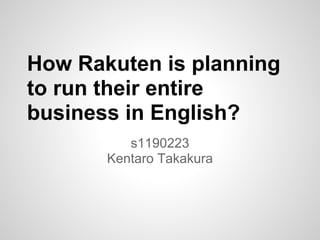ÎÞÌâ¥×¥ì¥¼¥ó¥Æ©`¥·¥ç¥ó
- 1. How Rakuten is planning to run their entire business in English? s1190223 Kentaro Takakura
- 2. Contents ¡ñ What is Rakuten? ¡ñ Brief History of Rakuten ¡ñ English in Rakuten ¡ñ Why is English so important? ¡ñ Businesses in foreign countries ¡ñ Conclusion ¡ñ References
- 3. What is Rakuten? ¡ñ Rakuten is one of the most largest e- commerce company in Japan. ¡ñ They expands their company to many businesses: ¡ð E-Commerce Market Place ¡ð Credit and Payments ¡ð Potral and Media ¡ð Travel ¡ð etc.
- 4. Brief History of Rakuten ¡ñ February 7, 1997: Founded ¡ñ December 7, 2000: M&A with Infoseek ¡ð 2000 to 2010, many M&As ¡ñ June 30, 2010: Decided to change their language to English ¡ñ July, 2012: Completed changing their language to English
- 5. English in Rakuten (1/2) ¡ñ In 2010, Rakuten decided to change their official language in workspace to English.¡ñ By the end of 2012, they are going to change their language to English entirely.¡ñ Hiroshi Mikitani, the CEO of Rakuten, desires his company to become a world company rather than a Japanese company.
- 6. English in Rakuten (2/2) ¡ñ Their policy is people who cannot speak English on some level in 2 years after they entered Rakuten, will be fired.¡ñ Even cafeteria menus are written in English.¡ñ Employees must take 600~750 TOEIC score.
- 7. Why is English so important? ¡ñ Rakuten has 6,000 employees but 400 are from foreign countries.¡ñ In their policy, they would like to expand their oversea sales, but Japanese people often cannot speak English. This is strong disadvantage. So they decided their language in the company entirely.
- 8. Businesses in foreign countries ¡ñ Rakuten has taken over (M&A) many companies even in foreign countries. ¡ð They are targeting foreign countries rather than Japan.¡ñ There are many world-wide companies in Japan: ¡ð Automobile Makers (Toyota, Nissan, Honda, etc.) ¡ð Uniqlo ¡ð Nomura Group ¡ð etc.¡ñ But being different with Rakuten, they dont have rules of language in companies.
- 9. Conclusion ¡ñ Rakuten is large Japanese e-commerce company, but they would like to expand their businesses to overseas.¡ñ They have strict rules of language in the company. ¡ð They must use English in the company.¡ñ Their policy is stronger than any other Japanese world-wide companies.
- 10. References ¡ñ Rakutens all-English edict a bold move, but risky too (The Japan Times) http://www. japantimes.co.jp/text/nn20100716f1.html¡ñ Rakutens decision on English not welcomed by everyone (JAPAN TODAY) http://www. japantoday. com/category/kuchikomi/view/rakutens- decision-on- english-not-welcomed-by- everyone¡ñ Rakuten to make English official language (Asahi.com) http://www.asahi. com/english/TKY201007010404.html










